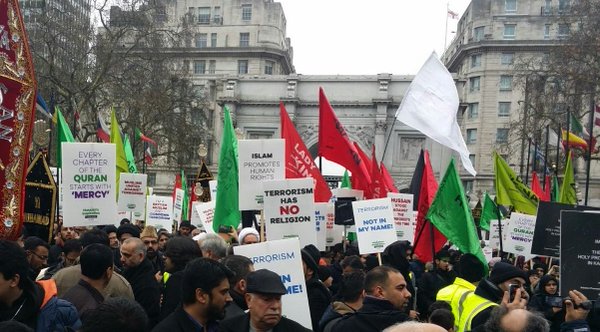Organisers of an anti-Isis march in London have spoken of their frustration after mainstream media outlets failed to cover the demonstration.
Thousands of people took part in the annual UK Arbaeen Procession, coordinated by the Husaini Islamic Trust UK, on Sunday.
Although Shia Muslims take part in the march each year to mark the Arbaeen, or mourning, anniversary of Imam Husain - a seventh-century leader who fought for social justice - this year organisers decided to use the event as a platform to denounce terrorism following the recent Isis attacks in Paris, Beirut and elsewhere.
Organiser Waqar Haider said: "This year we had hundreds of placards which were basically saying ‘no’ to terrorism and ‘no’ to Isis. A very direct message.
"For us it was a controversial move to go political. Normally we don’t mix politics with mourning. However with what's happened recently, we thought we had to make sure we as a community totally disassociate ourselves with what's happening elsewhere in the world."
Despite this, Mr Haider said the demonstration still failed to garner attention in the mainstream media because of "stereotyping".
"It is the oldest annual Muslim event in London but unfortunately it is very difficult to get any media coverage," he said.
"I think it's because of stereotyping. People see the entire Muslim community as one community.
"[But] the Muslim community is a very diverse community, with the vast majority of us horrified by Isis.
"With our event, we had so many people from different ethnic backgrounds. It's more of a family event in terms of people it attracts."
Volunteer Mohammed Al-Sharifi also commented on the lack of media coverage for the event.
In a tweet, he said: “Hundreds of Muslims flooded the streets of London yesterday to condemn terrorism. Media’s response: Silence.”
His post has been re-tweeted more than 5,000 times.
Other social media users also believed the demonstration should have been more widely covered.
Mr Al-Sharifi told The Independent: "I think the reason the mainstream media hasn’t covered the story is because I don’t think it's juicy enough to sell papers. It's simply not interesting enough."
"Unfortunately [some] media outlets have gone for stories that to some extent can be divisive. If a group of Muslims do something good, it's not mentioned or the religion is not mentioned. But if someone does something [negative], it is on the front page and their religion is mentioned."
"It's feeding this hatred and divisiveness and demonisation, I think, of Muslims."
He said the media had an increased level of responsibility to create a cohesive society.
"The reason my tweet went viral… is because I think people realise there is a huge disparity between what they're being fed in the media and the reality of the day-to-day interactions they have with Muslims at work, at school."
Mr Al-Sharifi called on the country's leadership to counter Islamophobia.
The Arbaeen processions take place in other locations around the world including Iraq, Nigeria and the US.
During this year's event in Kano, a Boko Haram suicide bomber killed at least 21 people.
Arba'een (Arabic: الأربعين, "forty"), Chehelom (Persian: چهلم, the fortieth [day]") is a Shia Muslim religious observance that occurs forty days after the Day of Ashura. It commemorates the martyrdom of Hussain ibn Ali, the grandson of Prophet Muhammad (PBUT), which falls on the 20th day of the month of Safar. Imam Hussain ibn Ali and 72 companions were martyred by tyrant Yazid I's army in the Battle of Karbala in 61 AH (680 CE). Arbaeen is one of the largest pilgrimage gatherings on Earth, in which up to 30 million people go to the city of Karbala in Iraq.
Arbaeen is the world's largest annual gathering, with the number of pilgrims far exceeding the two million visitors who descend on Mecca for the Hajj. The Kumbh Mela, a mass Hindu pilgrimage, attracts more pilgrims but is held only every three years.
/129

